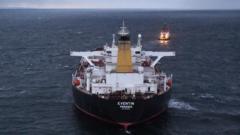Berlin condemns Putin's actions, citing risks to European security amid ongoing rescue operations.
Germany Flags Shadow Russian Oil Tanker Stuck in Baltic Sea

Germany Flags Shadow Russian Oil Tanker Stuck in Baltic Sea
As tensions rise over sanctions, the 'Eventin' tanker is linked to Russia's evasive maritime operations.
Germany's maritime authorities confirmed on Friday that the oil tanker stranded in German waters is part of Russia's so-called "shadow fleet," utilized to evade international sanctions. The Panamanian-flagged vessel, named Eventin, reportedly lost both power and steering, prompting the deployment of tugboats for rescue operations.
German Foreign Minister Annalena Baerbock attributed blame to the Kremlin, asserting that President Vladimir Putin is "circumventing" sanctions that threaten European security by deploying a fleet of aging tankers. Although Russia has refrained from commenting on the allegation of utilizing a shadow fleet, the U.S., U.K., and E.U. have imposed extensive sanctions on Russia's oil sector following its full-scale invasion of Ukraine in 2022.
The CCME (Central Command for Maritime Emergencies) noted that the tanker measures 274 meters in length and carries approximately 99,000 tonnes of oil, which was observed drifting in the Baltic Sea north of Rügen Island at a low speed. A specialized team was airlifted onto the vessel to secure towing connections, and three tugboats took charge of the situation. Fortunately, no oil leaks were reported.
In a recent update, CCME announced that the towing convoy was slowly making its way toward Sassnitz, aiming to reach the port by early Sunday. The convoy's movement has been carefully controlled due to the rough sea conditions, with waves reaching heights of about 2.5 meters.
While the vessel is registered under the Panamanian flag, German authorities maintain that it is linked to Russia's maritime activities. Baerbock emphasized the multifaceted threats Russia poses, from military aggression in Ukraine to maritime disruptions, illustrating these points through recent incidents involving undersea cable damage believed to be caused by vessels from the shadow fleet.
Last December, the European Union began seeking strategies to confront the potential risks posed by Russia's shadow fleet, which could jeopardize both security and the environment. The sanctions were a response to Russia's attempts to navigate international maritime regulations and deliver oil exports using ships with ambiguous ownership.
Reports indicate that Russia has been capitalizing on this shadow fleet, enabling it to circumvent the strict sanctions by employing vessels that do not meet standard maritime insurance and regulations. This unwanted maritime phenomenon has drawn scrutiny amidst new sanctions targeting Russian energy companies, with additional measures from the U.S. Treasury sanctioning 183 vessels associated with this shadow fleet.
As pressure mounts on Moscow interconnected to its oil industry, key political figures, including U.K. Foreign Secretary David Lammy, voiced intentions to drain Russia's war funding, emphasizing that these financial strains are essential for supporting efforts in Ukraine. In response, Gazprom Neft, a major Russian oil operator, dismissed the sanctions as unjust and unfounded, underscoring the ongoing economic battle playing out alongside geopolitical tensions.
German Foreign Minister Annalena Baerbock attributed blame to the Kremlin, asserting that President Vladimir Putin is "circumventing" sanctions that threaten European security by deploying a fleet of aging tankers. Although Russia has refrained from commenting on the allegation of utilizing a shadow fleet, the U.S., U.K., and E.U. have imposed extensive sanctions on Russia's oil sector following its full-scale invasion of Ukraine in 2022.
The CCME (Central Command for Maritime Emergencies) noted that the tanker measures 274 meters in length and carries approximately 99,000 tonnes of oil, which was observed drifting in the Baltic Sea north of Rügen Island at a low speed. A specialized team was airlifted onto the vessel to secure towing connections, and three tugboats took charge of the situation. Fortunately, no oil leaks were reported.
In a recent update, CCME announced that the towing convoy was slowly making its way toward Sassnitz, aiming to reach the port by early Sunday. The convoy's movement has been carefully controlled due to the rough sea conditions, with waves reaching heights of about 2.5 meters.
While the vessel is registered under the Panamanian flag, German authorities maintain that it is linked to Russia's maritime activities. Baerbock emphasized the multifaceted threats Russia poses, from military aggression in Ukraine to maritime disruptions, illustrating these points through recent incidents involving undersea cable damage believed to be caused by vessels from the shadow fleet.
Last December, the European Union began seeking strategies to confront the potential risks posed by Russia's shadow fleet, which could jeopardize both security and the environment. The sanctions were a response to Russia's attempts to navigate international maritime regulations and deliver oil exports using ships with ambiguous ownership.
Reports indicate that Russia has been capitalizing on this shadow fleet, enabling it to circumvent the strict sanctions by employing vessels that do not meet standard maritime insurance and regulations. This unwanted maritime phenomenon has drawn scrutiny amidst new sanctions targeting Russian energy companies, with additional measures from the U.S. Treasury sanctioning 183 vessels associated with this shadow fleet.
As pressure mounts on Moscow interconnected to its oil industry, key political figures, including U.K. Foreign Secretary David Lammy, voiced intentions to drain Russia's war funding, emphasizing that these financial strains are essential for supporting efforts in Ukraine. In response, Gazprom Neft, a major Russian oil operator, dismissed the sanctions as unjust and unfounded, underscoring the ongoing economic battle playing out alongside geopolitical tensions.





















